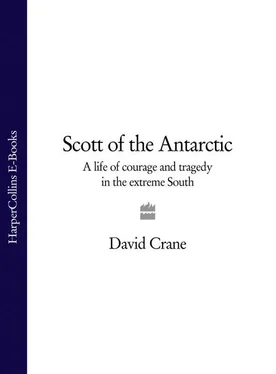The danger of finding himself typecast as a technical specialist was no idle fear, but in the June of 1899 a change of captain and ship’s personnel in Majestic gave him the opportunity he wanted. ‘Egerton joined today,’ Scott wrote to his mother from Portsmouth on the twenty-eighth; ‘things have occurred as I expected and I am commander until de Chair arrives in England. He will be telegraphed for when Bradford is promoted but as he is at Zanzibar the journey will occupy some time, so here I am till the end of August or thereabouts – of course it is a wonderful opportunity but means work unending as my own torpedo work has to go on somehow.’
If Scott had found in Prince Louis a captain who thought of him first and foremost as a ‘first rate’ torpedo man, in George Egerton, his old commander in Vernon , he had secured himself a powerful patron and friend. In the Dixonian dichotomy of ‘autocrat’ and ‘authoritarian’ Egerton’s credentials would almost certainly put him on the ‘wrong’ side of the fence, but that did not stop him being in many ways the beau idéal of a Victorian naval officer, spirited, brave, charming well-connected and – best of all in a culture that raised chivalric effort over mere efficiency – an old ‘Arctic’ from the disastrous but heroic Nares expedition of 1875.
Scott was not the sort of young officer who would naturally impose himself, but as the man in Majestic who knew the ship better than anyone, he was well placed to make a mark with his new captain. By the middle of September de Chair had taken up his post as commander, but while he was still ‘green’ in the job he, too, inevitably depended ‘pretty much’ on Scott’s advice and knowledge. It was, as Scott said, hard work but a comfortable situation. ‘The new Captain is very pleased with the ship,’ he reported home the following month, ‘as I am the only link with the past, so to speak, and knowing the game from experience … my position is a very strong one.’
Strong as his position was, it is another remark of Scott’s, a chance comment from a diary fragment – ‘The naval officer should be provided by nature with an infinite capacity for patiently accepting disappointments’ – that probably more accurately reflects his mood at this time. ‘In 1899,’ Grace recalled, ‘coming home in H.M.S. Majestic he said he must look out for something to take him out of the general rut of the Navy, a service he was devoted to, but he wanted freedom to develop more widely. All this time he had been realizing that he had really something to say, in some form or other as yet unknown. How could he express himself fully?’
It was the old angst of the Amphion diary fragment, only maturity had sharpened a vague adolescent dissatisfaction into a more intelligent need for growth. The 14,900-ton, first-class, twin-screw, armoured Majestic was hardly a ‘sleepy hollow’, but in its own way it was every bit as restricting and stultifying. Including Dartmouth, Vernon and that ‘farce’ of an institution, as Jellicoe labelled the Royal Naval College at Greenwich, where Scott had gone in preparation for his lieutenant’s examination, he had been doing more or less the same thing for nineteen years, and again the Majestic ’s ship’s log is the best guide to just what that meant: Weighed for Vigo. Anchored Vigo. Weighed for Gibraltar. Anchored Gibraltar. Weighed for Aranci. Anchored Aranci. Governor visited ship. French Admiral visited ship. Italian Royal Yacht Savoia with King and Queen of Italy passed through the lines. Royal salute. King and Queen arrived on board. Royal Salute. Weighed for Cagliari. Anchored Cagliari … Ship dressed in honour of King and Queen of Portugal. Royal Salute. Annual pulling regatta. Sailing regatta. Vice Admiral’s Cup.
At the end of March 1900 Majestic was at anchor at Berehaven, in attendance on the old Queen on her historic visit to Ireland. ‘We leave here on Saturday, arriving at Kingstown on Monday,’ Scott wrote home with a barely restrained irony, as if the whole purpose of the navy was to amuse some Imperial reincarnation of Miss Havisham. ‘The Queen comes on Tuesday, when we man ship and cheer and fire guns and generally display our loyalty.’
Grace was right. Scott needed something different. Her memoir, like those of all Scott’s early biographers, shows the same desire to give shape and meaning to his early years, to see them in quasibiblical terms as a kind of preparation for the ministry of sacrifice that was his polar career. Nevertheless, Grace’s portrait of frustration rings true. Again, brother and sister, speaking from their very different worlds, the one from the dressmakers’ shop, the other from one of the most formidable battleships of the pre-Dreadnought age, could see things in the same light. ‘What he wanted,’ she went on, were ‘great interests and expansion of life with new experiences … in contact with men of the big world [with] all sorts of experiences and interests.’
In the same year Scott, at least, found what he was looking for. In his letter home from Berehaven, he had announced with mock pomposity that June should ‘bring me to greater dignity’. That ‘dignity’ – commander’s rank – duly arrived on 30 June 1900. And with it came the command that was to transform his life.
Конец ознакомительного фрагмента.
Текст предоставлен ООО «ЛитРес».
Прочитайте эту книгу целиком, купив полную легальную версию на ЛитРес.
Безопасно оплатить книгу можно банковской картой Visa, MasterCard, Maestro, со счета мобильного телефона, с платежного терминала, в салоне МТС или Связной, через PayPal, WebMoney, Яндекс.Деньги, QIWI Кошелек, бонусными картами или другим удобным Вам способом.












![John Bruce - The Lettsomian Lectures on Diseases and Disorders of the Heart and Arteries in Middle and Advanced Life [1900-1901]](/books/749387/john-bruce-the-lettsomian-lectures-on-diseases-and-disorders-of-the-heart-and-arteries-in-middle-and-advanced-life-1900-1901-thumb.webp)